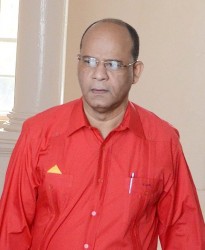Home Affairs Minister Clement Rohee has defended the proposed $413 million allocation for community policing groups for vehicle use and building maintenance, which is almost twice the funds proposed for the police force.
Since the reading of the government’s proposed 2014 budget, many have criticised the allocation for community policing groups for vehicles and building maintenance, while pointing out that the Guyana Police Force has been allocated almost half, $220 million, for the same purposes. Various critics have expressed concern that the police force is in need of new vehicles countrywide and instead the government has chosen to supply community groups with funding that could have been better used to improve the actual police force.

In his address on the 2014 budget, Rohee stated that to have a former commissioner of police—APNU’s Winston Felix—criticise the efforts of the community policing groups was ill advised.
Felix, during his presentation, had stated that the $413 million going to community policing groups was starving the joint services of much needed increases in remuneration.
He also stated that there has been no real audit on the various community policing groups and that while some function, others are delinquent and various complaints have been lodged by citizens within the various communities. Felix indicated that it was well known that group vehicles were used by individuals and kept parked at private residences, instead of being utilised for the use of community policing.
Rohee said the groups needed to be provided with funding because they provided vital police services in areas without large police presence.
It was noted that the Customs Anti-Narcotics Unit (CANU) was allocated $92 million, less than a quarter of what was budgeted for the community policing groups. Rohee praised CANU and Guyana’s ability to crack down on drug trafficking, which was met with a loud uproar from the opposition side of the house when members shouted the various items used to smuggle drugs out of the country, including most recently pastries and awara. Opposition members also asked Rohee about the large drug busts on shipments originating from Guyana on a regular basis.
Rohee, however, maintained that “wherever they hide it, we will find it.” He said too that the opposition need not mock the narcotics branch of the police, but instead should give it credit for continuing to intercept drugs.
The minister also used his presentation to announce that after multiple technical issues, the $840 million forensic lab will finally be operational by the end of April.
The sod turning for the lab was since September 2010, with extensions being provided ever since.
Most recently Rohee had stated that the lab would have been commissioned at the beginning of 2014.
Rohee stated that the lab was going to be a vital component in furthering the security services in Guyana. He stated that along with the lab, the Community Policing Groups were not to be criticised because without the cooperation of the community, the police are at a disadvantage.
Rohee also called for a holistic approach to security in Guyana. He said that focusing on crime was not public safety and instead a holistic approach had to be taken to fight drug trafficking, human trafficking and money-laundering. Rohee did not address what this holistic approach was and how it would be executed.
Rohee was interrupted halfway through his address by the APNU parliamentarian Basil Williams, who said that the minister needed to stay on track.
Williams stated that the standing orders provide that when persons are addressing the house they must be speaking on relevant issues. Rohee had been addressing the political atmosphere prior to 1992. Speaker of the House Raphael Trotman stated that Rohee could continue on, but had to curtail his speech to remain relevant to the House proceedings.





